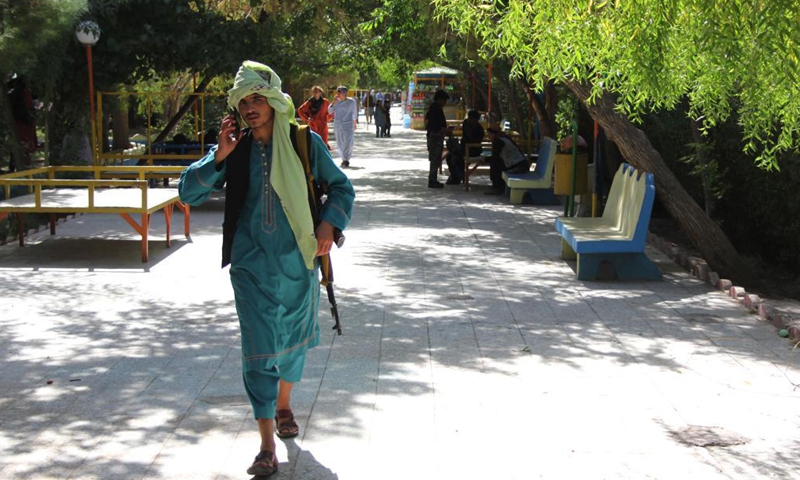
A Taliban militant is seen in Herat province, Afghanistan, Aug. 13, 2021. Photo:Xinhua
"It is a sunny day in Kabul. The Afghan workers who have guarded the Chinatown for a whole night are sleeping. Breakfast stalls appeared again in the streets with smiling vendors, happy that no official may come to fine them for a while. Western troops are leaving hastily without the spirit they carried when they first came… Chinese businessmen staying in the country are witnessing historic changes," Yu Minghui, a Chinese businessman who is staying in Kabul, Afghanistan, wrote on Monday - a day after the Afghan Taliban entered the capital city and US troops rushed to pack up and leave.
The Afghan Taliban has swept through the country in a matter of a week and took control of the presidential palace as the US-led forces withdraw. Video on social media shows helicopters and transport planes scrambling to evacuate mainly US and Western nationals. Observers have called this Kabul's "Saigon moment" - alluding to the incident when the US and its allies struggled to evacuate their personnel after the Vietnam War in 1975.
Chinese nationals in Afghanistan were arranged to return to China, but some chose to stay. The Chinese Embassy in Afghanistan is in touch with them and they are all safe, Hua Chunying, spokesperson of China's Foreign Ministry, told a press conference on Monday.
Hua noted that the ambassador and staff in the embassy are working normally.
"There are not too many Chinese companies in Afghanistan and many had returned one and a half months ago," Yu told the Global Times, noting that he and some people chose to stay as they have signed contracts with Afghan departments and did not want to ruin their business reputation.
"After doing businesses here for more than 20 years, we have become acquainted with people from all walks of life and taken advice from them… We installed more fences and increased security. We suspended business for three days to wait for the new policies," Yu said.
A man surnamed Zhang who has not left Kabul due to his work shared his experience before and after the Taliban entered Kabul.
"Power was cut off from 11 pm on Saturday until 6 am Sunday morning. After two hours, it went off again. The compound we live in has been sealed off with local residents not working and security guards not going outside," Zhang told the Global Times.
Zhang said they have stored food and fuel, and also drinking water. "Internet is available since we have a generator and Huawei network facilities."
Zhang said the Chinese Embassy in Afghanistan sent messages to Chinese nationals from June to July and helped them arrange planes to go home. He plans to return to China on Thursday.
The embassy released a notice on Monday morning, saying that the situation in Afghanistan and its capital Kabul has experienced drastic changes, and the embassy was in close contact with Chinese nationals to report the security situation and ready to offer assistance.
"So far, no Chinese casualties have been reported. The embassy has asked all parties in Afghanistan to ensure the safety of Chinese nationals and Chinese organizations. The embassy also asked Chinese nationals to stay indoors," read the release of the embassy.
At the beginning of July, the Chinese government evacuated 210 Chinese nationals from Afghanistan on a charter flight to Wuhan amid a deteriorating security situation.
In a statement issued on Sunday, the Taliban pledged safety to foreign citizens and diplomatic missions in Kabul.
Zhang said that he saw US helicopters coming and going more than 20 times. Gunshots rang out sporadically but not too many.
"The US had started to evacuate earlier, but this time, the evacuation was in the spotlight of the media… I think they underestimated the capability of the Taliban. The moment we saw the reappearance of the 'Saigon moment,' the US' failure became inevitable," said Zhang.
There are people who went to the streets to welcome the Taliban. "Previously, there were checking posts in different districts with police officers and SWAT standing there. But none of them are there anymore, neither the Taliban. Some friends told us that the Taliban soldiers on the outskirts of Kabul are there as guards," said Zhang.
"As far as I see the situation in Afghanistan, the Afghan government has collapsed so quickly and has left a big mess to the Taliban. The biggest problem that the Taliban will face is not the US troops or the government, but various terrorist groups hidden in villages and the south. It remains unknown how the Taliban will deal with these organizations," Zhang said.
When asked what he thought of Afghanistan's future, Yu said he has confidence that no matter which party takes power, they may seek China's help on infrastructure and production as compared with other neighboring countries. China has the most complete industrial chains.
Yu noted that China-made products have a wide market in Afghanistan, from shoes to kitchenware. But due to security reasons, fewer people want to invest in the country. Being battered by wars for more than 40 years, Afghanistan needs more for rebuilding and China's Belt and Road initiative can help.




